Text
Emilie Scholars, Dr. Julie Hayes and Dr. Julia Jorati, both study 16th-18th century philosophy and have graciously agreed to participate in a post-show talkback on Saturday, March 9th at 2pm in the Curtain Theater.

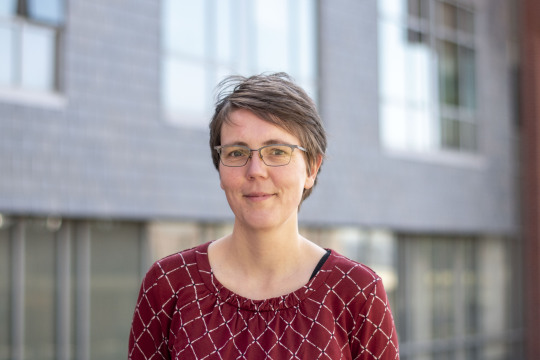
Dr. Julie C. Hayes (pictured left) is a Professor of French and the former Dean of the College of Humanities and Fine Arts at the University of Massachusetts Amherst. She has written Translation, Subjectivity, and Culture in France and England, 1600–1800 (2009); in addition to being an Emilie scholar, she also has worked on a monograph about seventeenth- and eighteenth-century women moral philosophers.
To celebrate her contributions to UMass, a part of the Arts Bridge, the Julie C. Hayes and Claude Bersano Recording Studio, is named in recognition of Hayes, and her late husband, Claude Bersano.
Dr. Julia Jorati (pictured right) is member of the Department of Philosophy at The University of Massachusetts, Amherst. Her main research area is the History of Early Modern Philosophy and she has completed two books on philosophical debates about slavery and race in the 16th–18th centuries. Also an Emilie scholar, Dr. Jorati is the co-director of Question Everything, a summer philosophy program for high school students.
0 notes
Text
More Vocal Warm-Ups w/ Director & Ca
0 notes
Text
Vocal Warm-Ups w/ Director & Cast
1 note
·
View note
Text
Video from Emilie rehearsal (Director & Cast)
0 notes
Text
Émilie: La Marquise du Châtelet Defends Her Life Tonight... and she defends women and happiness too.
Emilie is now coming to be known for her scholarly excellence as a mind of math and physics, but did you know she also impacted the French Enlightenment with profound notions of happiness and gender equality? If you didn't, I thought it may be worth sharing some quotes below.
1. “Let us choose for ourselves our path in life, and let us try to strew that path with flowers”
Emilie du Chatelet demonstrated her fearlessness through strength and courage, but she also expressed fearlessness as a spirit led by compulsive drive, persistent purposefulness, and radical honesty. Emilie already held the conviction to set her own course in life, yet she still prioritized permeating graciousness and generosity while setting that course. Having interest that intersect at science and philosophy, Emilie desired to discover the secrets of the universe. Rather than be unnerved with panic or immobilized with fear at this opportunity to change the world, Emilie’s fearlessness made her path immovable and inevitable. Beyond contributing to physics and mathematics in ways that advanced the fields, Emilie du Chatelet gave humanity a message revealing that when we walk the path that fulfills our hearts, we’ll always have enough love to leave a trail for others.
2. “If I were king, I would redress an abuse which cuts back, as it were, one half of human kind. I would have women participate in all human rights, especially those of the mind”
Emilie challenged societal norms as a youth and was cognizant, even then, that gender is not a limitation. Emilie’s awareness made her mind strong and unsusceptible to long-told fables that woman are inferior to men. However, this same awareness granted Emilie the insight that even perception of gender can have damaging effects; Emilie avoided these effects by submitting her works under Voltaire’s name to encourage/solicit a fair judgement. It raises the question, how much more might Emilie have accomplished in science if her gender was not inherently a limitation to accessing public and financial support of academic pursuit? It is necessary to discern that Emilie did experience some unique privileges due to her access to wealth, and therefore, would not have been dissuaded from studying as heavily as a less fortunate woman. But it’s difficult to separate Emilie from the ghost of countless brilliant women who sharpened their minds amidst the muck of misled men; along with the other women who even after learning and refining, still had their merits credited to dishonest men.
3. “And the perpetual combat of this effort of fire and of the resistance bodies offer to it, produces almost all the phenomena of nature”
Love or Philosophy? While an enjoyable question to consider, the reality is that Emilie excelled at both. She contributed to translating and advancing the world of physics through study. Yet, she also had a life that was fulfilled with love, passion, and romantic embraces. In this way, her novel approach to thinking of people and energy as a metaphysical system actually ties love and philosophy together, it doesn’t pit them against each other. Fire, in and of itself, will cause human bodies to repel and resist it. However, if that fire is within another person, the same temperature and energy can become a magnet that draws others in. Emilie may compliment and subdue the men in her life by referring to them as elements, but the truth is that her lifework embodied the elements of Earth the best - she was as graceful as water, as dangerous as fire, and unforgettably electric.
4. “I have always thought that the most sacred duty of men was to give their children an education that would prevent them, when they were older, from regretting their youth, which is the only time when one can truly get an education; you, my dear son, have now arrived at this happy age when the mind begins to think, and when the heart isn't yet subject to those intense emotions that will later come to disturb it”
Emilie understood that study is more complex than the raw consumption of new information because true learning requires the learner to be in a certain headspace conducive to receiving new information. Emilie navigated the intense emotions of life such as true love, grief, heartbreak, and betrayal while still pushing forward the envelope of scientific discovery. Emilie cautions us to take advantage of our youths, because for the more fortunate of us, adolescence will be absent of heavy disturbances that impede learning. In utilizing the privilege of learning freely in an peaceful environment, our minds will have a chance to receive and retain so much more. In short, most of us are not good for ourselves or anyone else when our hearts our disturbed; but the same lot of us can move mountains when it’s a peace.
5. “As no two things in life are alike, it is almost always useless to see one’s errors, or at least to pause a long time to consider them and to reproach oneself with them. In so doing we cover ourselves with confusion in our own eyes for no gain.”
Emilie deserves admiration and acknowledgment for advancing the philosophy of happiness and simultaneously expanding the world of physics, almost four-hundred years ago. She faced resistance from friends and family who encouraged her to consider the error of her ways and stay in a woman’s place; but Emilie stayed committed to her path instead. Emilie’s boundless ambition directed her to relentlessly seek progress, and in seeking progress Emilie realized that there isn’t room for guilt or ruminating in mistakes. With this message, Emilie reminds us to let go of guilt and shame, and rather to- “forgive ourselves; guilt may write us letters often, but we don’t have to write back”
0 notes
Text
Portraits of each character in the play. Each quote is either from the pictured person, or Emilie Du Chatelet.
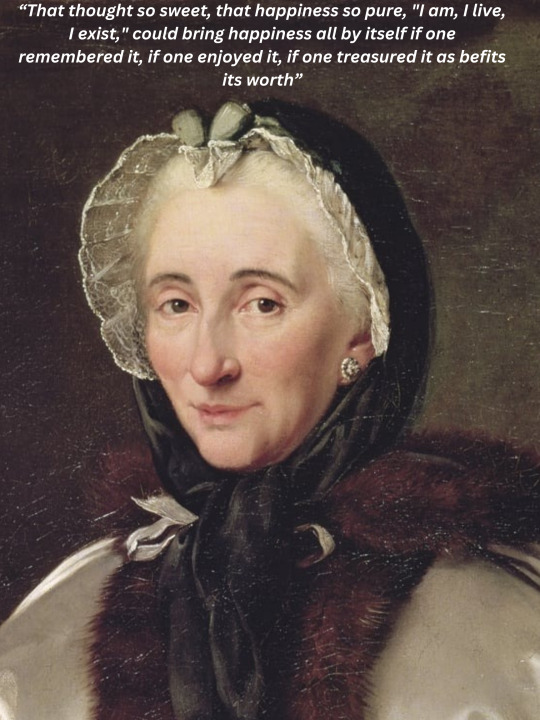
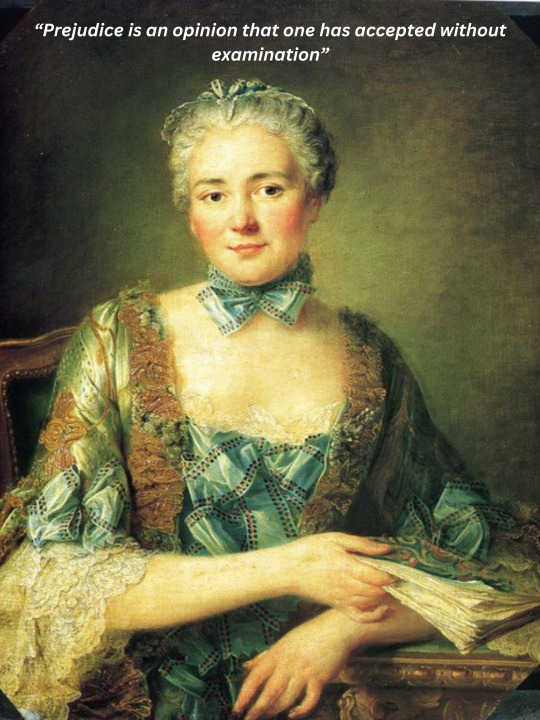
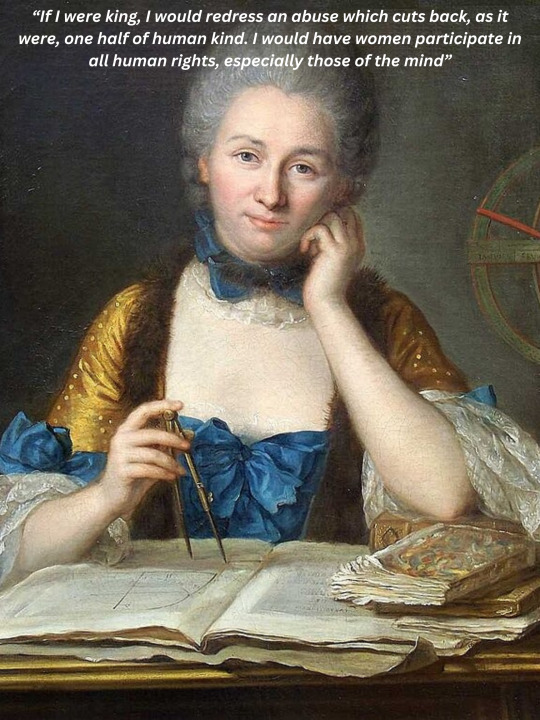
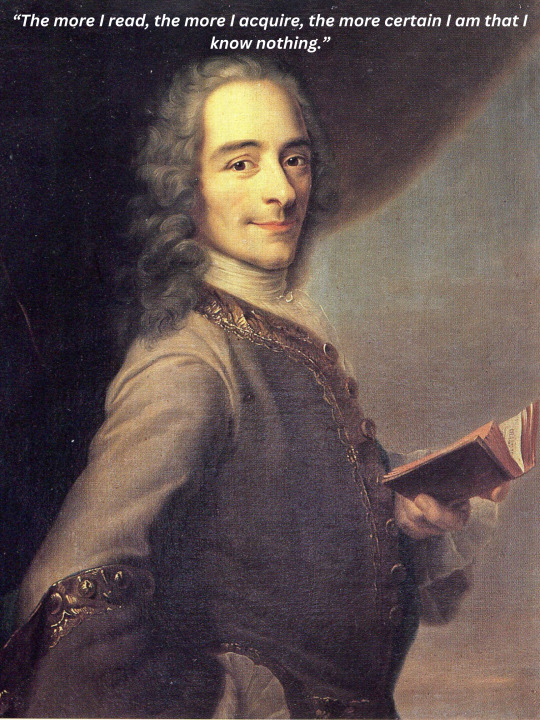



#dramaturgy#emilieduchatelet#voltaire#madamegraffigny#Pierre-Louis Moreau de Maupertuis#Marquis Florent-Claude de Châtelet-Lomont#Jean-François#Marquis de Saint-Lambert#Émilie du Châtelet#Marie Louise Mignot
0 notes
Text
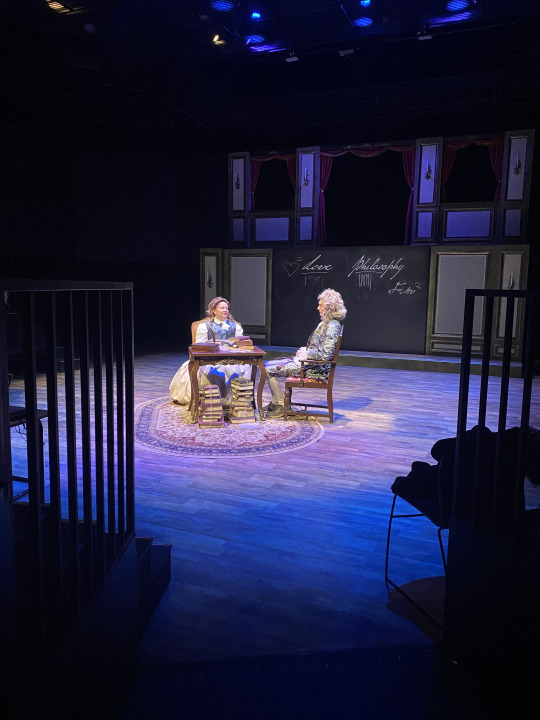
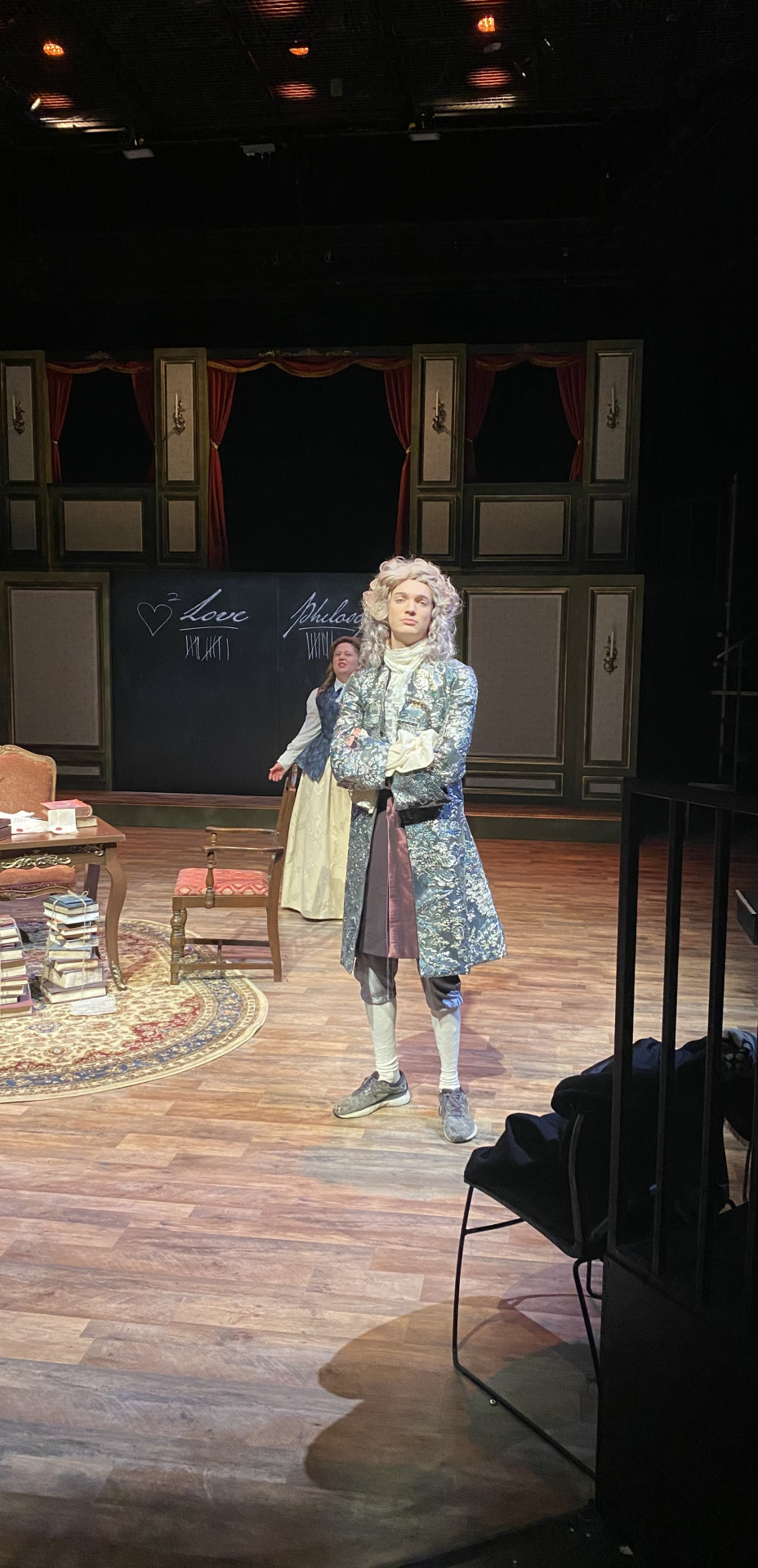
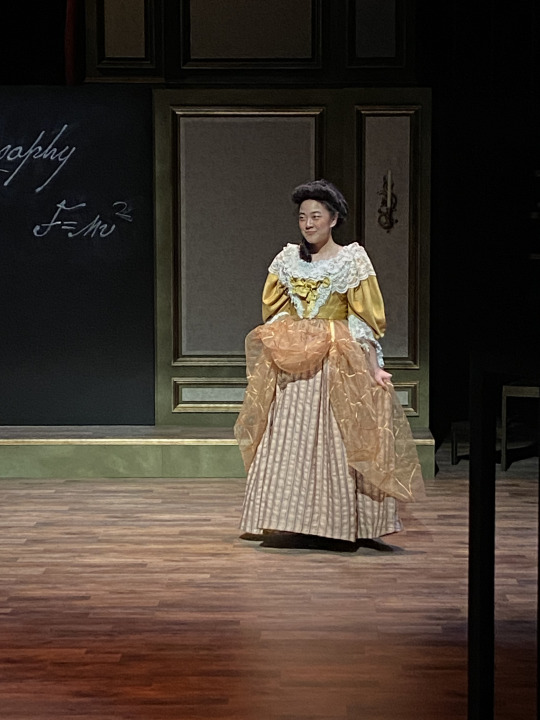


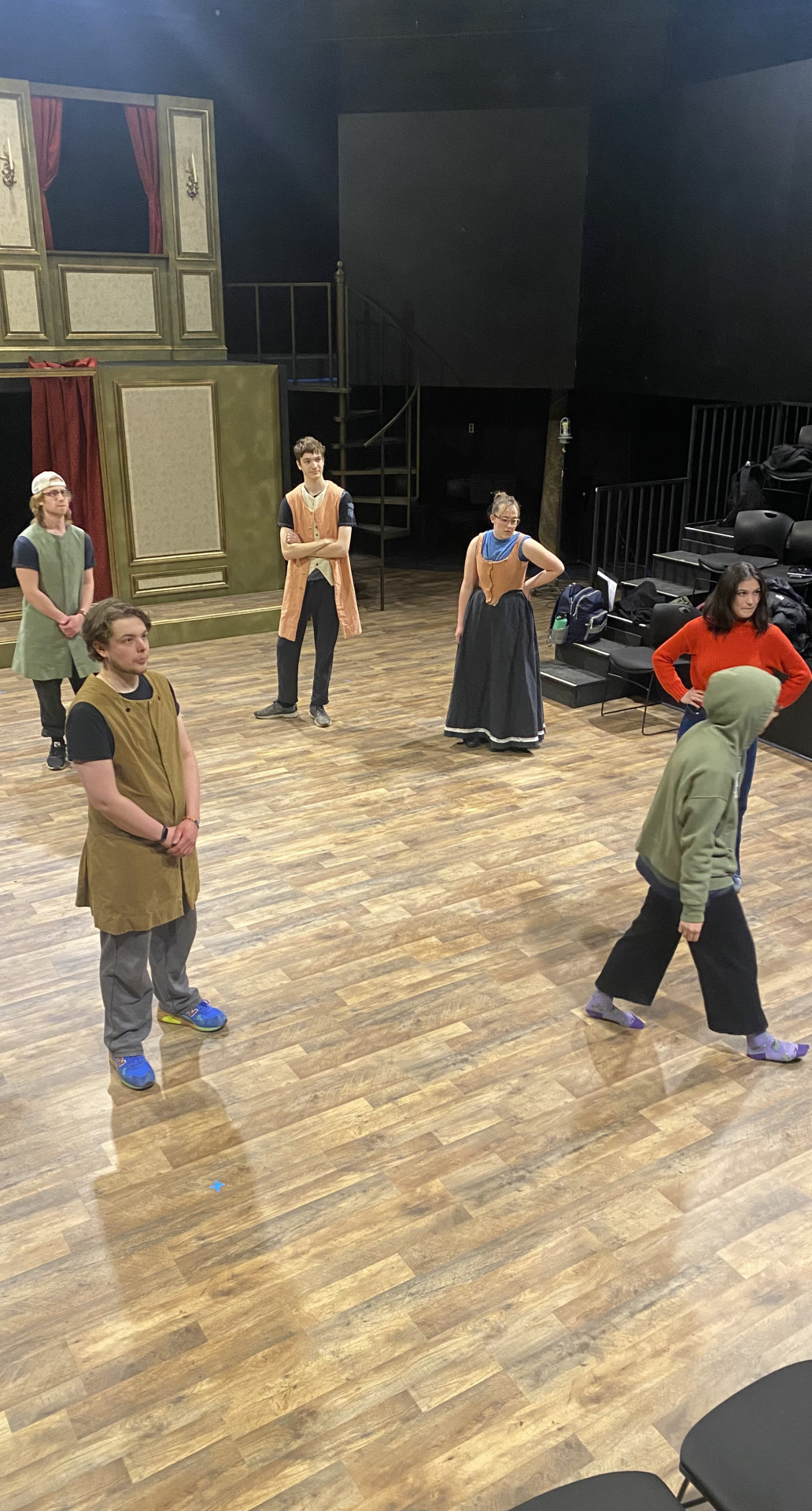

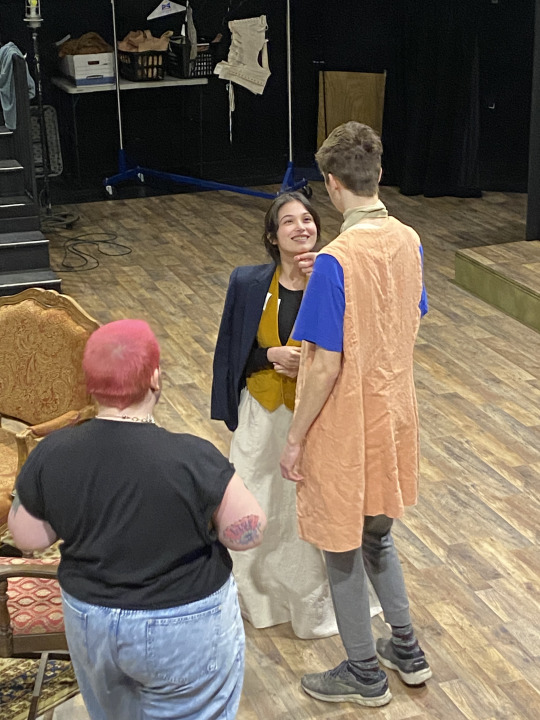
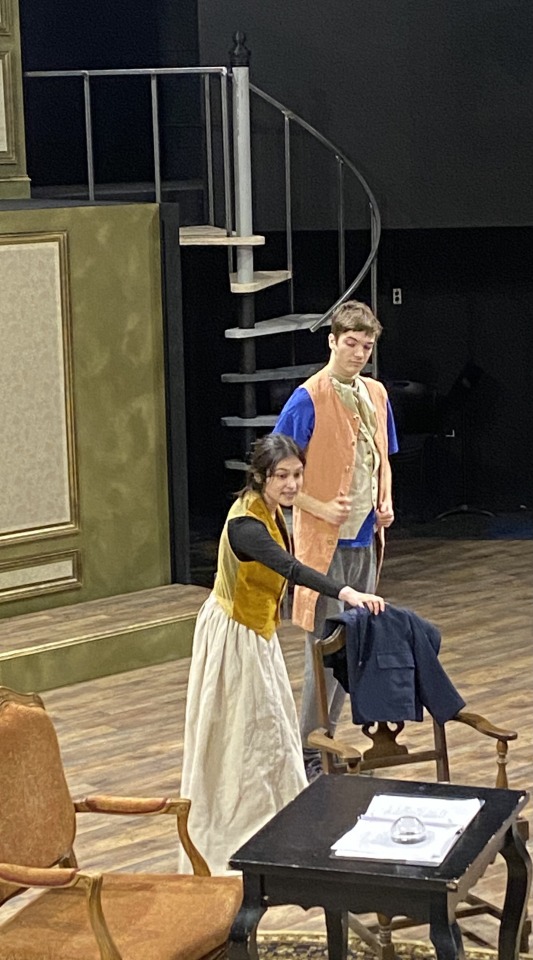

Photos of cast members at rehearsal's
#emilieduchatelet#voltaire#dramaturgy#Mary-Louise Mignot#Madame Denis#Madame Graffigny#Marquis Florent-Claude de Châtelet-Lomont:#Pierre-Louis Moreau de Maupertuis#Jean-François#Marquis de Saint-Lambert#Émilie du Châtelet
11 notes
·
View notes
Link
The Many Patterns, One Cloth text includes the story of Oshun and the Birth of One-Tura. We are using version translated by Rowland Abiodun and published in Yoruba Art and Language: Seeking the African in African Art (Cambridge University Press, 2014). The link provided here matches the version we have included in our play.
0 notes
Text
Collective Writing as Community Care
by Tatiana M. Rodriguez, lead playwright

0 notes
Photo

Company members, designers, and crew during tech notes, photo credit: Nathaniel Akingbemi
“Collective writing is, in essence, a way to practice radical empathy and inclusivity. It reaffirms the importance of plurality as an approach to meaning making. Society cannot evolve for the better if we remain disconnected, apathetic, and single-minded about the experiences of the people around us.”
From the essay titled, “Collective Writing as Community Care,” by Tatiana M. Rodriguez, lead playwright for Many Patterns, One Cloth. The full essay is also posted on this site.
0 notes
Text
Nathaniel Akingbemi’s Reflection
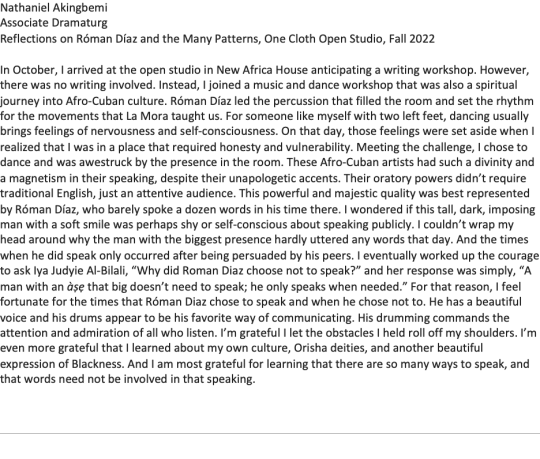

Photo of Róman Díaz
0 notes
Photo

UMASS Theater undergrad Marco Ulysse reflects on our fall development process: During my time in Latinx Devised Theater, I learned about the African & LatinX diaspora. I was fortunate enough to learn about the diety Oshun of Yoruba culture. Oshun is often associated with love, water, and purity. I was able to intertwine my love for cinematography in this class by being able to capture moments from our open studios. Each open studio was electric and the energy in the space was mesmerizing. I met two talented performers named Danys “La Mora” Perez and Róman Díaz. La Mora would light up the room with their dances while Róman would play beats and melodies to match La Mora’s steps. The chants, drums, and movements happening created the soul you can feel when viewing the material. I never thought I would enjoy a class this much, so shout out to Dr. Page & Prof. Al-Bilali. Thank you for allowing us to freely express our experiences, thoughts, and opinions, which helped me gain insight into many of the topics we learned.
0 notes
Video
Elisa Gonzales, Professor of Voice and Acting, joined us in the rehearsal room this week to lead vocal warm-ups, share feedback, and offer one-on-one coaching with members of the ensemble.
0 notes
Photo
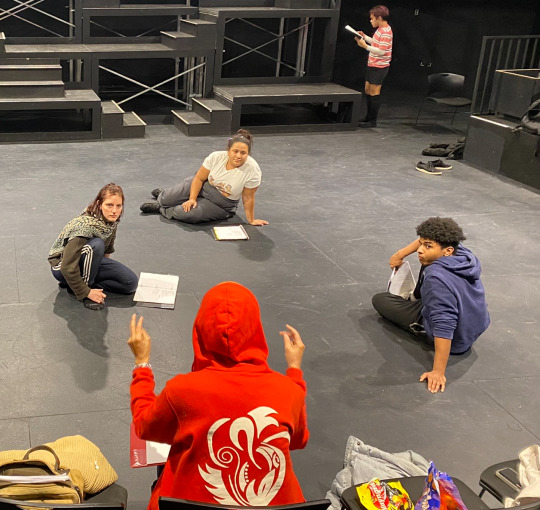
In the rehearsal room for Many Patterns, One Cloth with Prof J who is giving notes to Antonia, Jordan, and Malik with Whit in the background.
Photo credit: Nathaniel Akingbemi, assistant dramaturg
0 notes
Video
The cast of Many Patterns, One Cloth dancing, playing, and radiating magic!
video credit: Nathaniel Akingbemi
0 notes
Text
“and the arrow went on and on, from heart to heart, tribe to tribe, and generation to generation”
Aurash is a fable which explores themes such as individuality, nationalism, loyalty, freedom, and more. More literally, it is a story about fighting against oppressive foreign forces in Iran, in the name of community, tradition, and freedom. It is of note that UMass Amherst’s Theater department is mounting a play based on this fable, while Iran is currently going through much political upheaval. Although the theater department did not choose to produce Aurash for this reason, it is notable that politics in Iran have influenced this particular production and its rehearsal process, foundationally, and irrevocably.
On March 22nd, 2022, UMass Amherst’s Theater Department released a sneak preview of the productions they were planning on producing in the upcoming academic year. Aurash, suggested by Iranian MFA director Behnam Alibakhshi, was among them. At the time, what was said about the upcoming play was this:
As envisioned by Behnam Alibakhshi, this production will allow students and designers to get more familiar with Eastern legendary myths and theatrical traditions… allowing for an adventurous storytelling process… Aurash builds on the Department’s growing reputation as a place for Persian/Iranian performance (Committee).
It is clear that the political state in Iran was neither a driving force nor a deciding factor in the selection of Aurash. At the time of the play’s selection, the most internationally relevant news about Iran was in relation to their natural resources such as uranium and oil, their ability to manufacture a nuclear weapon, and the Ukraine/ Russia war (Erlanger).
However, in the fall of 2022, a few months prior to the beginning of rehearsals, Mahsa Amini, a young Iranian woman was arrested, and later killed in Iran by the morality police, for allegedly not wearing her Hijab properly. This set off a wave of protests and political demonstrations in Iran, in which individuals would burn their headscarves, cut their hair, and chant “death to the dictator”. The spirit of protest spread, and citizens began to rally against their government, the freedom it denies, and injustices it wages against its own people (Cloud).
At Aurash’s first rehearsal in mid November, the director, Benham Alibakhishi made it clear that although Iranian politics were not directly relevant to the production at the beginning, now they were very much so. Alibakhshi read Bani Adam, by poet Saadi Shirazi, aloud to the cast and production team, and showed striking photos of a few of these bold, Iranian women. Iranian current events had begun to shape the show, in ways such as casting, wherein a woman was cast in the traditionally male role of Aurash to pay respect to the women who were victims and leaders in the protests in Iran.
In mid-December after a few weeks of rehearsing, UMass began its winter break. At this time, the New York Times published an opinion guest essay by Karim Sadjadpour titled “The Question Is No Longer Whether Iranians Will Topple the Ayatollah”, which argued that Iranians will inevitably win out over their oppressive government, and have true freedom. In the article, Abbas Amanat, a historian of Iran says this,
“For nearly two millenniums, Persian political culture and, in a broader sense, a repository of Persian civilizational tools successfully managed to convert Turkic, Arab and Mongolian conquerors… Persian language, myth, historical memories and timekeeping endured… It is Iranian culture and patriotism that are threatening to undo the Islamic Republic” (Sadjadpour).
The message put out by this article was one of optimism, strength, and endurance.
However, as students returned from winter break in early 2023, this uplifting message had taken a turn, as the practical hardships started to show their strain on this political movement. In the New York Times “The Daily” podcast there was a segment on the difficulties facing journalists and protesters alike in Iran. Sabrina Tavernise interviewed Cora Englebrecht who spoke about the dangers of being a journalist in Iran, the executions of civilians, and the slowing down of the protests in general (Tavernise). It seemed like the protests in Iran were losing steam, and losing hope.
Despite the increased difficulty of forming protests, and the crackdown on journalists, the people of Iran are still protesting against the current Islamic Republic government. As recently as February 11th, there has been a bold act of resistance against Iran’s president Ebrahim Raisi. During the president’s televised speech in honor of the 44th anniversary of the Islamic Revolution, a hacker disrupted the programming with a clear message of retaliation. A logo popped up on the screen with the name of the group, and a voice which shouted "Death to the Islamic Republic" (Reuters).
The protests in Iran are ongoing, and the pain and injustice continues. To quote Saadi Shirazi’s Bani Adam:
"Human Beings are members of a whole/ In creation of one essence and soul/ If one member is inflicted with pain/ Other members uneasy will remain/ If you have no sympathy for human pain/ The name of human you can not retain".
If you would like to offer some help with the ongoing situation in Iran, below, there are links to some petitions. These petitions and information have been provided by director Behnam Alibakhshi.
Expel Iran’s diplomats.
Free a prisoner.
[Dramaturgy by Micki Demby-Kleinman]
Cloud, David S. Who is Mahsa Amini, and Why Did Her Death Spark Protests in Iran?, 23 September 2022, https://www.wsj.com/story/who-is-mahsa-amini-and-why-did-her-death-spark-protests-in-iran-d4236eb3. Accessed 11 February 2023.
Committee, Season Selection. Season Proposal FINAL. 2022.
Erlanger, Steven. “How Russia’s War in Ukraine Complicates the Iran Nuclear Deal.” The New York Times, 8 March 2022, https://www.nytimes.com/2022/03/08/world/europe/iran-nuclear-deal-russia-ukraine.html. Accessed 11 February 2023.
Reuters, ? “Hackers interrupt Iran president's TV speech on anniversary of revolution.” CNN, 12 February 2023, https://www.cnn.com/2023/02/12/middleeast/hackers-interrupt-iran-leader-revolution-anniversary-intl-hnk/index.html. Accessed 19 February 2023.
Sadjadpour, Karim. “Opinion | The Question Is No Longer Whether Iranians Will Topple the Ayatollah.” The New York Times, 12 December 2022, https://www.nytimes.com/2022/12/12/opinion/iran-protests-veil-khamenei.html. Accessed 12 February 2023.
Tavernise, Sabrina. Arrests, Executions, and the Iranian Protesters Who Refuse To Give Up. New York Times, 2023.
0 notes
Text
TIMELINE
A brief selection of current events/ Iranian politics in the news.
“Aurash” is selected- Iran is not really a main player in United States news, only relevant because it is related to other issues
https://www.nytimes.com/2022/03/08/world/europe/iran-nuclear-deal-russia-ukraine.html
Pre rehearsal - Mahsa Amini gets killed while in police custody
https://www.wsj.com/story/who-is-mahsa-amini-and-why-did-her-death-spark-protests-in-iran-d4236eb3
Rehearsals have begun- protests are still ongoing, strongly
https://www.nytimes.com/2022/12/12/opinion/iran-protests-veil-khamenei.html
Rehearsals to resume after winter break- Protests are more underground
https://www.nytimes.com/2023/01/27/podcasts/the-daily/iran-protests.html
Rehearsals continue- protestation is shown in unique ways, in any way possible
https://www.cnn.com/2023/02/12/middleeast/hackers-interrupt-iran-leader-revolution-anniversary-intl-hnk/index.html
It continues.... please stay informed...
[Dramaturgy by Micki Demby-Kleinman]
0 notes